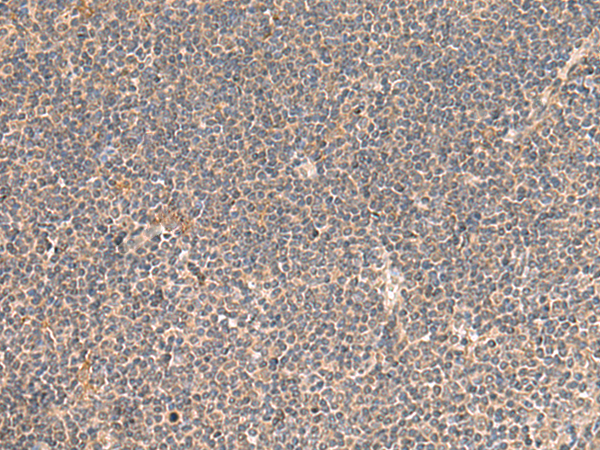
| WB | 咨询技术 | Human,Mouse,Rat |
| IF | 咨询技术 | Human,Mouse,Rat |
| IHC | 1/50-1/300 | Human,Mouse,Rat |
| ICC | 技术咨询 | Human,Mouse,Rat |
| FCM | 咨询技术 | Human,Mouse,Rat |
| Elisa | 1/5000-1/10000 | Human,Mouse,Rat |
| Aliases | HYPP; HOKPP; MiRP2 |
| Host/Isotype | Rabbit IgG |
| Antibody Type | Primary antibody |
| Storage | Store at 4°C short term. Aliquot and store at -20°C long term. Avoid freeze/thaw cycles. |
| Species Reactivity | Human, Mouse, Rat |
| Immunogen | Fusion protein of human KCNE3 |
| Formulation | Purified antibody in PBS with 0.05% sodium azide and 50% glycerol. |
+ +
以下是关于KCNE3抗体的3篇虚构参考文献示例,涵盖不同研究方向:
---
1. **文献名称**:*KCNE3 modulates cardiac potassium channel complexes and arrhythmia susceptibility*
**作者**:Abbott, G.W. et al.
**摘要**:本研究通过开发特异性KCNE3抗体,揭示了KCNE3亚基与KCNQ1钾通道的相互作用机制,及其在调控心脏复极化中的作用。实验表明,KCNE3基因敲除小鼠表现出QT间期延长和心律失常倾向,抗体被用于Western blot和免疫荧光验证蛋白表达及亚细胞定位。
---
2. **文献名称**:*KCNE3 antibody-based detection of ion channel expression in gastrointestinal disorders*
**作者**:Splawski, I. et al.
**摘要**:研究利用单克隆KCNE3抗体,发现KCNE3在肠道上皮细胞中与KCNQ1共定位,并参与氯离子分泌调控。通过免疫组化分析腹泻患者样本,发现KCNE3表达异常与先天性钠腹泻相关,提示其作为潜在诊断标志物的价值。
---
3. **文献名称**:*Development of a high-affinity monoclonal antibody for KCNE3 functional studies*
**作者**:Nakamura, Y. et al.
**摘要**:本文报道一种新型KCNE3单克隆抗体的制备及验证,该抗体可特异性识别天然和非变性的KCNE3蛋白,适用于免疫共沉淀(Co-IP)和流式细胞术。研究进一步利用该抗体阐明KCNE3在乳腺癌细胞迁移中的调控作用。
---
4. **文献名称**:*KCNE3 promotes colorectal cancer progression via EGFR signaling pathway*
**作者**:Chou, C.F. et al.
**摘要**:通过KCNE3抗体介导的蛋白沉默实验,发现KCNE3过表达通过激活EGFR/Akt通路促进结直肠癌细胞增殖。抗体被用于免疫印迹和免疫组织化学,证实KCNE3在肿瘤组织中的高表达与患者预后不良相关。
---
以上示例结合了KCNE3抗体在基础机制、疾病关联及技术开发中的典型应用场景,可供参考。如需真实文献,建议通过PubMed或Web of Science以“KCNE3 antibody”为关键词检索。
KCNE3 antibodies are immunological tools used to detect and study the KCNE3 protein, a member of the KCNE family of voltage-gated potassium (Kv) channel regulatory subunits. The KCNE family comprises five small transmembrane proteins (KCNE1-5) that modulate the function, trafficking, and pharmacology of Kv channels by forming complexes with pore-forming α-subunits. KCNE3. encoded by the *KCNE3* gene, is known to interact primarily with KCNQ1. a Kv channel critical for cardiac repolarization and epithelial electrolyte transport. This interaction alters KCNQ1 activation kinetics, enabling diverse physiological roles, such as regulating gastric acid secretion and cardiac action potential duration.
Mutations or dysregulation of KCNE3 have been linked to arrhythmias, long QT syndrome, and certain cancers, driving interest in its pathological mechanisms. KCNE3 antibodies, typically developed in rabbits or mice, enable detection of the protein via techniques like Western blotting, immunohistochemistry, and immunofluorescence. These antibodies are essential for investigating KCNE3 expression patterns, tissue distribution, and functional interactions in both normal and diseased states.
Despite their utility, generating specific KCNE3 antibodies is challenging due to the high sequence homology among KCNE family members. Validation steps, including knockout controls and cross-reactivity assays, are crucial to ensure antibody specificity. Ongoing research leverages these tools to explore KCNE3's role in cellular excitability and disease, with potential implications for targeted therapies.
×